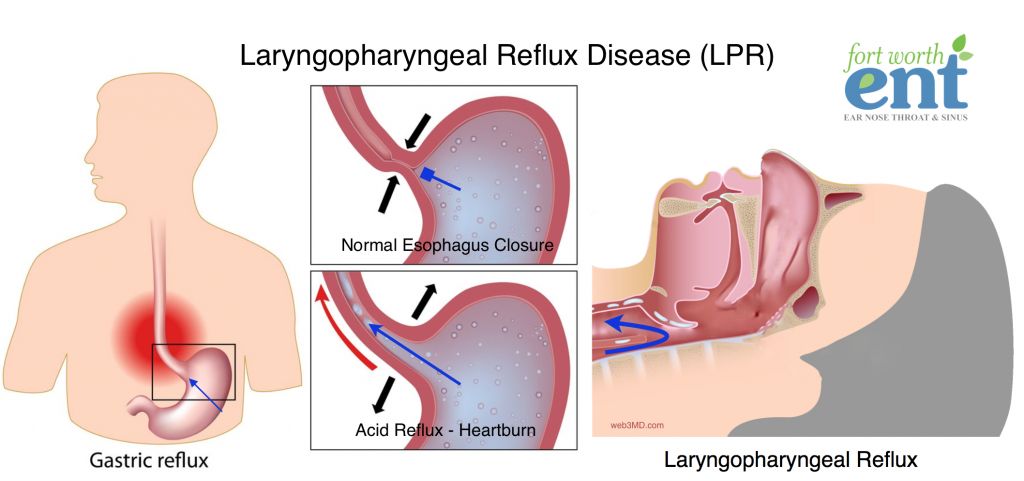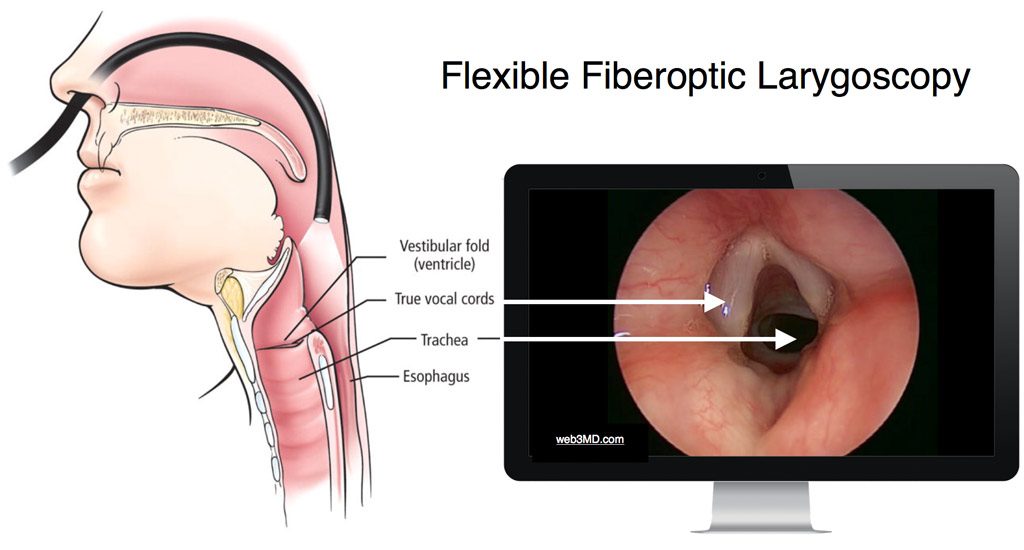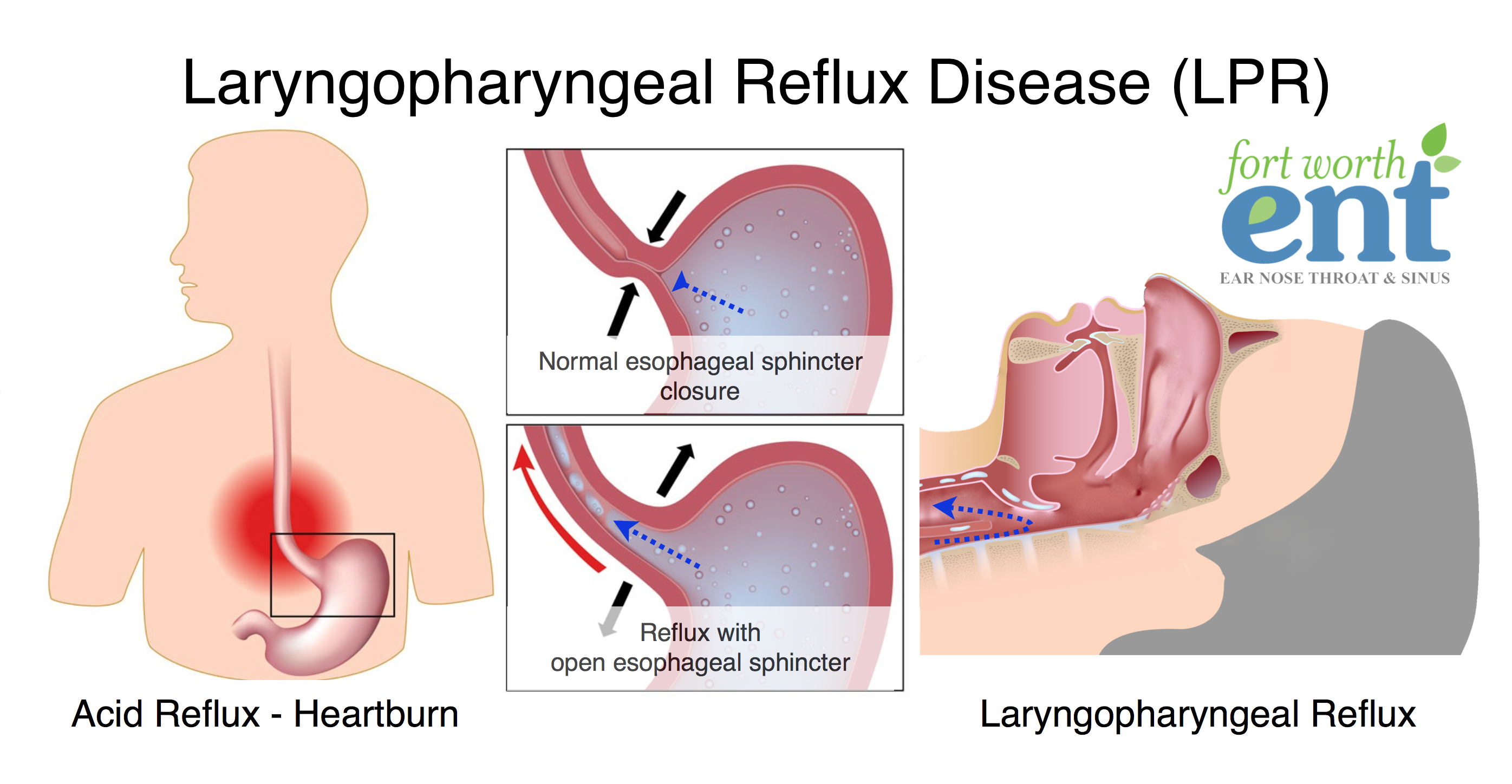
Causes of Laryngopharyngeal Reflux Disease (LPR)
The esophagus, where food travels, has a ring of muscle at each end, known as a sphincter. When working correctly, these muscles control the stomach and keep the contents inside. However, in patients suffering from laryngopharyngeal reflux, their sphincters don’t work the way they’re supposed to. Gastroesophageal reflux occurs when the lower esophageal sphincter (LES) is weak and allows stomach contents to flow up into the esophagus. With laryngopharyngeal reflux, stomach acid works its way into the throat (pharynx) or voice box (larynx) and sometimes into the back of the nasal airway. The effects of this can be inflammation in areas that are not protected against gastric acid exposure. This disease is very common in babies, as their sphincters are not yet fully developed, their esophagus is shorter, and they are often lying down. The cause of LPR in adults is not yet known.Symptoms of Laryngopharyngeal Reflux Disease (LPR)
The common symptoms of laryngopharyngeal reflux in infants and children can include any of the following:- Difficulty feeding, spitting up, or inhaling food
- Difficulty gaining weight
- Hoarseness
- Chronic cough or ‘barking’
- Noisy breathing
- Pauses in breathing (apnea)
- Reactive airway disease (asthma)
- Hoarseness
- A persistent cough
- Excessive throat clearing
- A lump in the throat that doesn’t desist even after swallowing
- Sore throat
- Difficulty breathing
- Difficulty swallowing
- Postnasal drip or excess throat mucus
Complications of Laryngopharyngeal Reflux Disease (LPR)
The effects of overexposure to acid on the throat and larynx can cause complications of LPR. The long-term effects of irritation and damage can cause serious issues if left untreated. In children, these complications can be:- Ulcers
- Narrowing of the area directly below the vocal cords
- Recurring ear infections due to problems with Eustachian tube function
- Lasting buildup of middle ear fluid
- Scarring of the throat and voice box
- Increased risk of cancer in this area of the body
- Lung damage
- It can also irritate or worsen conditions like asthma, emphysema or bronchitis
Diagnosis of Laryngopharyngeal Reflux Disease (LPR)
 A doctor examining the throat and vo cal cords using a rigid or flexible telescope called laryngoscopy usually diagnoses laryngopharyngeal reflux disease. If the patient is suffering from laryngopharyngeal reflux, the voice box will appear red, irritated and swollen from the acid reflux damage. With medical treatment, these issues will resolve, though the healing process can take several months.
In some other cases, the patient may be asked to participate in a dual-channel pH probe test in order to get a clear diagnosis. This process involves the placement of a small tube fed through the nose into the esophagus. The tube is then worn for 24 hours, during which time it measures the acidity of the refluxes into the patient’s throat.
A doctor examining the throat and vo cal cords using a rigid or flexible telescope called laryngoscopy usually diagnoses laryngopharyngeal reflux disease. If the patient is suffering from laryngopharyngeal reflux, the voice box will appear red, irritated and swollen from the acid reflux damage. With medical treatment, these issues will resolve, though the healing process can take several months.
In some other cases, the patient may be asked to participate in a dual-channel pH probe test in order to get a clear diagnosis. This process involves the placement of a small tube fed through the nose into the esophagus. The tube is then worn for 24 hours, during which time it measures the acidity of the refluxes into the patient’s throat.
Treatment of Laryngopharyngeal Reflux Disease (LPR)
There are several approaches to treatment of this condition, and often these solutions are two-fold.- LPR is usually settled with medication (Proton Pump Inhibitors/PPI’s).
- In some severe cases, surgery is required, especially if medications do not solve the issue. The surgery that is prescribed is known as Laparoscopic Nissen Fundoplication and can be performed by a general surgeon.
Personal Changes to Address Laryngopharyngeal Reflux Disease (LPR)
It is important to point out that although the cause of laryngopharyngeal reflux is not yet known, there are factors that are known to contribute to its existence and when addressed can significantly reduce the symptoms of LPR. The most well-known factors associated with laryngopharyngeal reflux are:- Caffeine: Caffeinated drinks are known to cause symptoms of reflux, particularly soft drinks. Soft drinks like Coke and Pepsi are the worst offenders due to their acidic nature (pH of 2.3) and the combination of this with carbonation and the belching that often comes with, brings further reflux into the throat.
- Fruit Juices: Juices that are high in acidity, such as orange, grapefruit, cranberry etc. can worsen reflux.
- Alcohol: Reducing alcohol intake, especially late in the evening and before bedtime, has proven to reduce problems of acid reflux.
- Smoking: The effects on the body are not limited to the lungs, as smoking has been known to cause or be a catalyst for reflux issues.
- Chocolate and Mints: Some ingredients in these can worsen issues, so it is best to avoid them as much as possible if you are experiencing reflux problems.
- Fried and Fatty Foods: Taking these types of foods out of your diet and opting for a low-fat diet is a sure way to avoid reflux. Onions and garlic are known to cause reflux.
- Weight: If you are overweight and have a high BMI, losing weight will help reduce symptoms.
- Late Night Snacking: For several reasons, it is best to avoid food late at night, so choosing to stop eating several hours before bed is wise. Heavy meals at night can exacerbate the issue.
- Medication: Make sure to take the medicines that have been prescribed to you by your doctor. These will significantly help the problems you have with reflux.
- Elevating the Head of the Bed: If your symptoms are particularly bad in the morning, it might be wise to try raising your head level when you sleep. However this does not work if you simply place several pillows. It is important to try raising the entire head of the bed.
Diagnosis and Treatment
If you are suffering with any of the above symptoms and have been for a significant length of time, or with regular occurrences, contact us to schedule an appointment. Although it may not seem like a dangerous disease, as can be seen above, the cost of ignoring the condition and not seeking treatment can be serious. If you would like an appointment with one of our physicians at Fort Worth ENT & Sinus please complete an online appointment request or phone 817-332-8848.Frequently Asked Questions
Yes. Unlike GERD, many people with LPR do not feel the classic burning sensation in the chest. That’s why it is sometimes called “silent reflux.” Instead, symptoms like hoarseness, chronic cough, throat clearing, or a sensation of a lump in the throat are more common.
LPR is usually diagnosed through laryngoscopy, where a doctor examines the throat and vocal cords using a flexible or rigid scope. In some cases, a dual-channel pH probe test may be used to measure acid exposure in the throat over 24 hours for a more precise diagnosis.
Absolutely. Adjustments such as avoiding caffeine, acidic juices, alcohol, smoking, chocolate, and fatty foods, along with maintaining a healthy weight, reducing late-night meals, and elevating the head of the bed, can significantly reduce symptoms and complement medical treatment.
The approach is similar but tailored to age. In children, feeding adjustments and careful monitoring are often part of treatment. Adults typically receive medications like proton pump inhibitors (PPIs), and in severe cases, surgical options like Laparoscopic Nissen Fundoplication may be considered.
Yes. Chronic acid exposure can cause scarring of the throat or voice box, lung irritation, recurring ear infections in children, and even increase the risk of certain cancers. Early diagnosis and management are important to prevent long-term complications.



